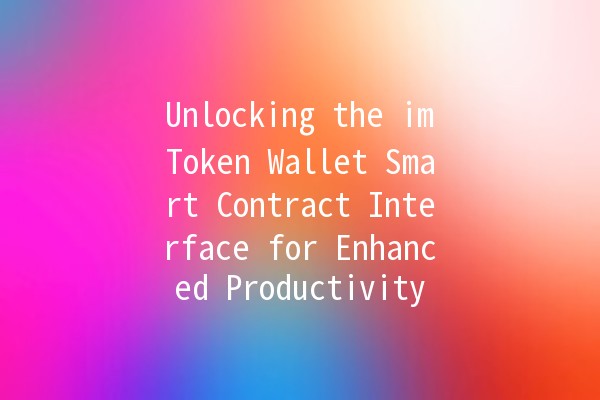The rise of blockchain technology has opened up new opportunities for developers and users alike. Among the myriad of assets in the crypto ecosystem, imToken wallet stands out as a popular choice among digital asset holders. This article delves into the imToken Wallet’s smart contract interface, exploring its capabilities and offering practical tips to enhance your productivity.
imToken is a mobile cryptocurrency wallet that supports various digital assets and decentralized applications (dApps). With a userfriendly interface and robust security features, it has become a trusted tool for storing, managing, and exchanging digital assets.
Smart contracts are selfexecuting contracts with the terms of the agreement directly written into lines of code. They are crucial in automating transactions on the blockchain without intermediaries. With the imToken wallet, developers can leverage the smart contract interface to enhance their applications’ functionality.
To maximize your productivity with the imToken wallet’s smart contract interface, implementing specific techniques can significantly streamline your processes. Here are five essential tips:

Explanation: Using prebuilt smart contract templates can save time and effort during development. These contracts have been tested and optimized, reducing the likelihood of bugs.
Practical Application: Developers can access platforms offering prebuilt contract templates compatible with imToken. For instance, by utilizing common templates like ERC20 tokens, you can focus on customizing the business logic instead of coding from scratch.
Explanation: Objectoriented programming (OOP) allows developers to create modular smart contracts, making them easier to manage and update.
Practical Application: Incorporate OOP principles into your smart contract development on imToken. For example, create base contracts for common functionalities which can be inherited by other contracts, reducing code redundancy and simplifying the debugging process.
Explanation: Automated testing is crucial for ensuring that your smart contracts function correctly before deployment. This practice can prevent costly errors down the line.
Practical Application: Use frameworks like Truffle or Hardhat to implement automated testing for your contracts. By writing unit tests that cover all functions and edge cases, you can catch errors early and ensure that your smart contracts behave as expected.
Explanation: The imToken SDK provides tools that facilitate the integration of your smart contracts with the wallet. This reduces the time needed for development and enhances user experience.
Practical Application: Use the imToken SDK to connect your decentralized application (dApp) seamlessly. For example, you can create a token swap feature that allows users to exchange tokens directly within the imToken wallet, enhancing functionality and user engagement.
Explanation: Analytics provide insights into how users interact with your smart contracts, enabling you to make datadriven improvements.
Practical Application: Implement tracking mechanisms that gather data on transaction volume, user engagement, and any errors that occur. This information can be invaluable for optimizing your smart contracts and understanding user behavior.
imToken employs a range of security measures to protect user data and assets. These include private key encryption, biometric authentication, and multisignature support. When deploying smart contracts, it is also vital to conduct thorough audits and use welltrusted libraries to minimize vulnerabilities.
Yes, you can interact with external smart contracts using the imToken wallet. The interface supports various Ethereumbased dApps and enables users to connect to different smart contracts. Ensure you have the correct contract address and necessary permissions for interaction.
When you perform transactions involving smart contracts on the Ethereum network through imToken, you will incur gas fees. These fees are paid to miners for processing transactions. Users can adjust gas prices based on network congestion, allowing for quicker transaction confirmations.
Recovering lost funds stored within a smart contract can be very challenging. Once a transaction is executed, it is irreversible. This highlights the importance of rigorous testing and auditing of smart contracts to prevent accidental loss of funds.
Common mistakes in smart contract development include failing to conduct thorough testing, neglecting security audits, and not handling exceptions properly. Always prioritize security and ensure that your contracts are as bugfree as possible before deployment.
To stay informed about updates to the imToken wallet and its smart contract interface, regularly check their official documentation, subscribe to their newsletter, or join community forums and social media channels where announcements are made.
By harnessing the power of the imToken wallet and utilizing these productivityenhancing techniques, developers can create robust smart contracts that meet user needs and adapt to the evolving cryptocurrency landscape. Dive in, explore the smart contract interface, and take your applications to new heights with imToken!